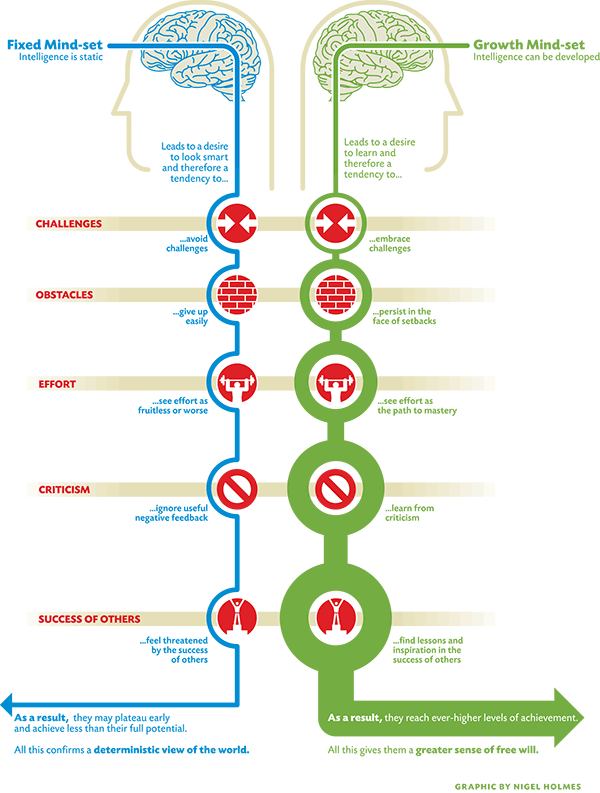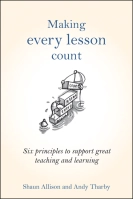 I’ve decided to use the spring break as an opportunity to catch up on some long overdue reading – starting with ‘Mindset’ by Carol Dweck. The theory explored in this book is that there are two types of mindset – fixed and growth.
I’ve decided to use the spring break as an opportunity to catch up on some long overdue reading – starting with ‘Mindset’ by Carol Dweck. The theory explored in this book is that there are two types of mindset – fixed and growth.
The diagram below summarises the main qualities exhibited by each one:
It’s obvious to see the relevance of this to us as teachers and Dweck presents a very compelling case for it. Whilst the theory is interesting, what I’m most interested in is what we can actually do in schools, in lessons, to move more of our students from a fixed to a growth mindset? This is the real challenge of teaching!
![]() So what follows is an initial attempt to look at each of the qualities of the ‘growth mindset and some of the strategies and techniques we use as teachers to develop this in students.
So what follows is an initial attempt to look at each of the qualities of the ‘growth mindset and some of the strategies and techniques we use as teachers to develop this in students.
Links to other relevant posts and blogs have also been included, within this post.
Embrace challenges
- Tell students that they will be doing challenging learning in lessons – and tell them why you think they will be able to do it. Build them up and show you have belief in their success.
- Plan activities that will be ‘low stress, high challenge’ for all – so, know the abilities of your students and stretch them accordingly.
- Use the idea of ‘extender tasks’ for the more able – so they are not just given more work to do, but specific, challenging tasks to extend their thinking.
- Celebrate their successes when they overcome a difficult task or activity. Discuss with them how they overcame the challenges.
Persist in the face of setbacks
- Show students strategies they can use when they become stuck e.g. use the 5Bs:
 So, when students get stuck instead of asking the teacher straight away, they are encouraged to think about it first (Brain), look in their exercise book/ text book, look on the board (or a display) and finally if they are still stuck, as a friend (Buddy). If after all of this they are still stuck, ask the teacher (Boss). Thanks to Jim Smith (@thelazyteacher) for this – his book has many more excellent strategies to develop independence.
So, when students get stuck instead of asking the teacher straight away, they are encouraged to think about it first (Brain), look in their exercise book/ text book, look on the board (or a display) and finally if they are still stuck, as a friend (Buddy). If after all of this they are still stuck, ask the teacher (Boss). Thanks to Jim Smith (@thelazyteacher) for this – his book has many more excellent strategies to develop independence.
- Think carefully about your questioning. When students are stuck, don’t just give them the answer. Carefully scaffold your questions to support them with getting ‘unstuck’.
- Use exams and assessments formatively. Show them how they can learn and make progress from a disappointing response to an exam or assessment. See previous post.
- Most importantly, don’t let them give up!
See effort as the path to mastery
- Praise students specifically for the efforts they are making with their learning.
- Honesty is required here….the path to mastery is not always fun and exciting and will be hard, requiring grit and determination. But it will always be worth it. See David Didau’s (@thelearningspy) post on ‘The Grand Unified Theory of Mastery’. Puts me in mind of this!
- Provide them with the opportunities within lessons, or a series of lessons, to practice, consolidate and embed skills and knowledge. All too often we glance over things, without actually giving students the opportunity to master what they are doing.
- This also gives them the opportunity to see when they have mastered things – make this explicit to them and celebrate it.
Learn from criticism
- Whilst formative feedback (written or formal) is important, it only becomes useful when students are given the opportunity to respond to it – so we need to plan opportunities in lessons for them to do this:
- An example of this can be seen here.
- David Fawcett (@davidfawcett27) discusses this brilliantly in his blog post – Creating a culture for critique. Improving student feedback and acting upon it
Find lessons and inspiration in the success of others
- Celebrate the success and achievements of others and use this as a learning opportunity for others. This previous post discusses how one teacher, Steve Bloomer (@SbloomerBloomer), does this in textiles.
- When discussing answers to questions or responses to activities, find good examples from students, share them and then discuss why they were good.
- Find examples of great scientists, artists etc to discuss during lessons – why were they great? What qualities did they have?
- Get students to take control of finding out what progress their peers have made during a lesson e.g. plenary prefects.
 So, much of what great teachers already do will help to develop a growth mindset within their students – this what makes them successful teachers. Again though, if we think about this in terms of ‘marginal gains’, we should all be able to think about small changes we can make to our classroom practice, to support and develop this even further.
So, much of what great teachers already do will help to develop a growth mindset within their students – this what makes them successful teachers. Again though, if we think about this in terms of ‘marginal gains’, we should all be able to think about small changes we can make to our classroom practice, to support and develop this even further.
The ideas in this post are just a starting point – and I’ll look to add to them in the future.
I look forward to hearing from colleagues about other ‘marginal gains’ they have made in this area.














Excellent Shaun Read Mindset last summer, inspiring work Sue
Sent from my iPad
Pingback: The Finishing Line | Class Teaching
Reblogged this on More than just Content and commented:
Nice post on growth mindset. I reblogged because I thought the practical suggestions on what to do in class were paticularly good.
Pingback: 2012-13 and all that….. | Class Teaching
Pingback: Growth Mindset Attributes | Class Teaching
Pingback: Developing Independence | Class Teaching
Pingback: Developing a growth mindset | Class Teaching | Learning Curve
Pingback: Students spotting gritty students | Class Teaching
Pingback: 2013 – A year of blogging…. | Class Teaching
Pingback: Developing a growth mindset | Class Teaching (Shaun Allison) | Mr Williams Maths
Pingback: Growing our mindset | Class Teaching
I’ll right away snatch your rss feed as I can
not in finding your e-mail subscription link or e-newsletter service.
Do you have any? Please permit me understand so that I could subscribe.
Thanks.
Pingback: SNYB Original: Turning Pessimists into Optimists | Steve Nash Youth Basketball Blog
Pingback: Growth Mindset? | mrbenney
Pingback: 37 Ideas to Grow Gritty Learners by @Powley_R | UKEdChat - Supporting the Education Community
Pingback: Developing a growth mindset | It just Dawned on me...